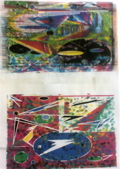Difference between revisions of "Discovery"
| Line 3: | Line 3: | ||
'''Discovery''' observations form acts of detecting and [[learning]] something. Discovery observations are acts in which something is found and given a productive insight. [[Serendipity]] is the effect by which one accidentally discovers something fortunate, especially while looking for something else entirely.[http://en.wikipedia.org/wiki/Discovery_%28observation%29] | '''Discovery''' observations form acts of detecting and [[learning]] something. Discovery observations are acts in which something is found and given a productive insight. [[Serendipity]] is the effect by which one accidentally discovers something fortunate, especially while looking for something else entirely.[http://en.wikipedia.org/wiki/Discovery_%28observation%29] | ||
| + | |||
---- | ---- | ||
Revision as of 19:33, 7 January 2008
Discovery observations form acts of detecting and learning something. Discovery observations are acts in which something is found and given a productive insight. Serendipity is the effect by which one accidentally discovers something fortunate, especially while looking for something else entirely.[1]
Anagnorisis (ænəgˈnɒrɨsɨs; ἀναγνώρισις), also known as discovery, originally meant recognition in its Greek context, not only of a person but also of what that person stood for, what he or she represented; it was the hero's suddenly becoming aware of a real situation and therefore the realization of things as they stood; and finally it was a perception that resulted in an insight the hero had into his relationship with often antagonistic characters within Aristotelian tragedy. Northrop Frye, "Myth, Fiction, And Displacement" p 25 Fables of Identity", ISBN 0-15-629730-2
